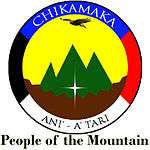Chikamaka Band
The Chikamaka Band is an organization based in Tennessee, Alabama, and Georgia, who self-identify as American Indians descended from Chickamauga Cherokee band, who lived the Tennessee River valley area near Nickajack in the 1790s and early 1800s, then retreated from the river bottom land and migrated up to the Cumberland Plateau in and around Tracy City, Tennessee.[1]
 | |
| Motto | People of the Mountain |
|---|---|
| Headquarters | Tracy City, Tennessee |
| Location |
|
Official language | English |
| Website | chikamaka |
Members
The members of the Chikamaka Band claim descent from American Indians, who came together resisting the encroachments of European-descended settlers of what became the United States of America.[2] The Chikamaka Band has written that their alliance, known as the Chickamauga Confederacy, was largely made up of people from the following American Indian groups: Chikamaka, Catawba, Cherokee, Chickasaw, Choctaw, Itsate Creek, Creek, Delaware, Mohawk, Natchez, Saponi, and Shawnee.[2] It also included allied groups of Tories, many of whom were of Scottish, Irish, or German origin.[2]
Recognition status
On 19 June 2010, the Tennessee Commission of Indian Affairs recognized the Chikamaka Band as a Tennessee State Indigenous American Indian Tribe;[3] however, the state attorney general's office declared that recognition "void and of no effect" on 3 September 2010.[4] The Chickamaka Band is an unrecognized tribe, which neither state recognition or federal recognition. (The Band has not applied for federal recognition.)
On May 12, 2015, three of the six tribes impacted by the State Attorney General's declaration filed a Federal law suit, Tanasi Tribe et al v. Robert E. Cooper, Jr. et al (JRG1), claiming the nonrecognition amounts to "intentional discrimination".[5]
History
Current members of the Chikamaka Band claim descent from intertribal groups that they claimed joined Dragging Canoe,[6] (1738–1792), a Chickamauga Cherokee who was born and died in Monroe County, Tennessee.
Controversy
There has been an ongoing battle between the Cherokee and the tribes native to Tennessee. At stake is claim to land and rights that include building casinos.[7] The Chickamaka are opposed to casinos. The Cherokee filed the original lawsuit to stop the Tennessee Commission of Indian Affairs from recognizing the native groups, State recognition of these tribes weakens the claims of the Cherokee.[8]
See also
- Chickamauga Cherokee, an 18th-century group that broke away from the Cherokee who were part of the Overhill Confederation led by Dragging Canoe
Notes
- "open to persons who can trace their American Indian heritage back to 1900 and earlier to lineal ancestors." - Chikamaka literature 2008
- "Who are the Chikamaka?". Chikamaka Band official web site. Archived from the original on 3 January 2010. Retrieved 23 February 2010.
- Tennessee Commission of Indian Affairs List of State Recognized Tribes
- Humphrey, Tom. "6 Indian groups lose state recognition: Court order says commission violated open meetings law." Knoxville Sentinel. 3 September 2010 (retrieved 3 September 2010)
- "Tanasi Tribe et al v. Robert E. Cooper, Jr. et al (JRG1)" (PDF). 05/12/2015. Retrieved 2018-09-09. Check date values in:
|date=(help) - "The Chikamaka Band of Chickamaugas."
- https://www.timesfreepress.com/news/local/story/2018/jan/21/bill-seeking-return-76-acres-cherokee-homelan/461736/
- http://knoxblogs.com/humphreyhill/2015/06/14/lawsuit-over-de-recognition-as-tn-indian-tribes/
References
- Nicholson, James (2006) [1982]. Grundy County. University of Memphis Press. p. 8. ISBN 978-0-87870-134-6.
Further reading
- Satz, Ronald N. Tennessee's Indian Peoples (1979, University of Tennessee Press with cooperation from the Tennessee Historical Commission)
- Armstrong, Zella The History of Hamilton County and Chattanooga Tennessee: Volume I, (Chattanooga Tennessee: Lookout Publishing Company
